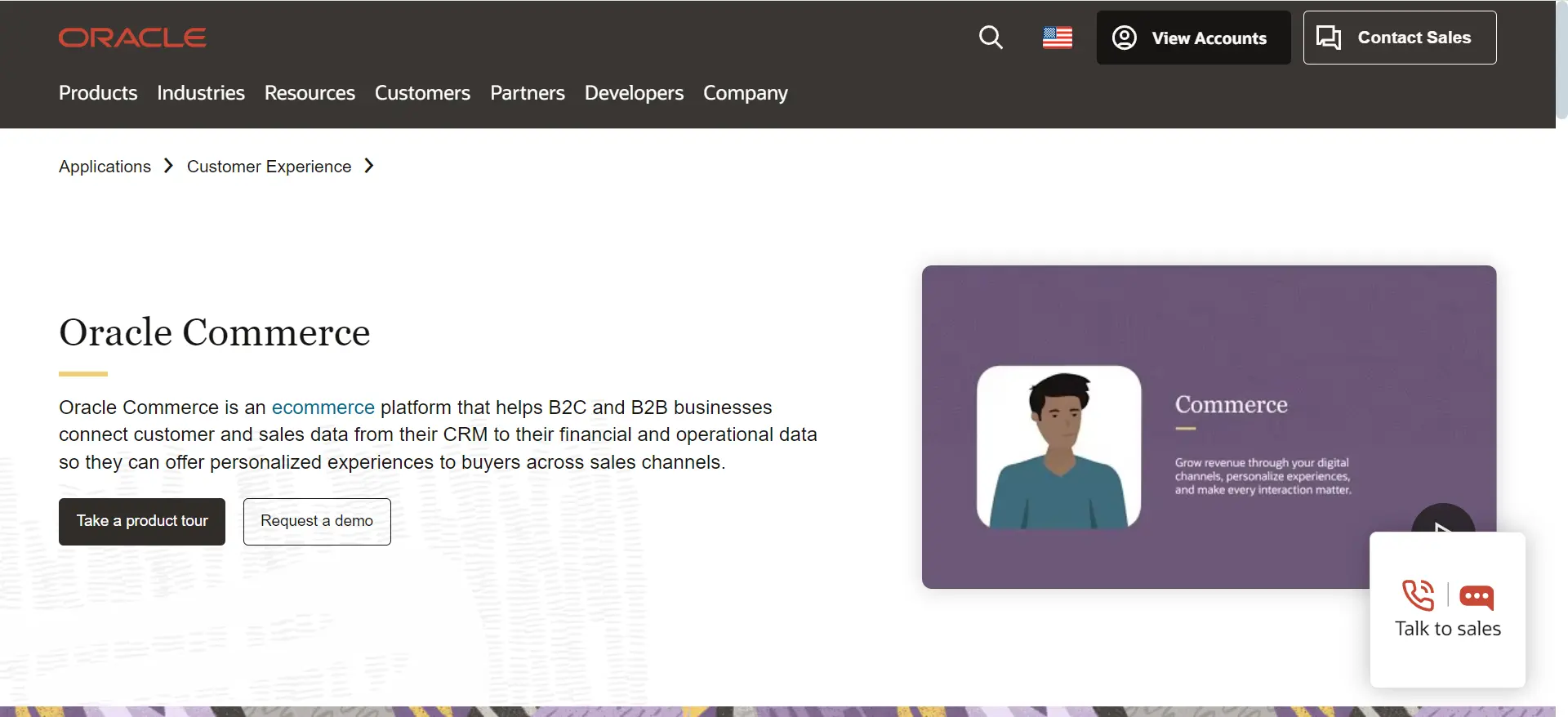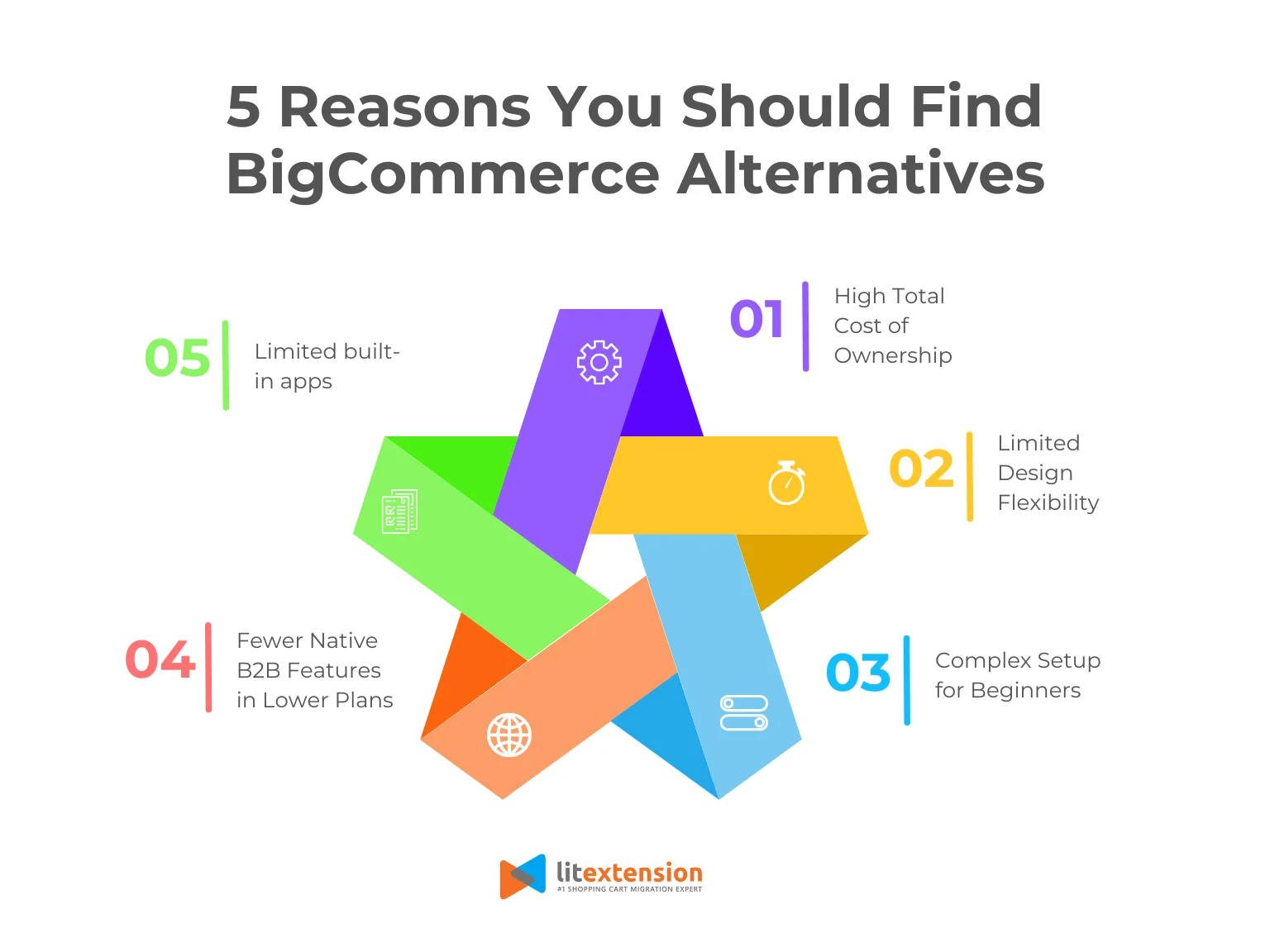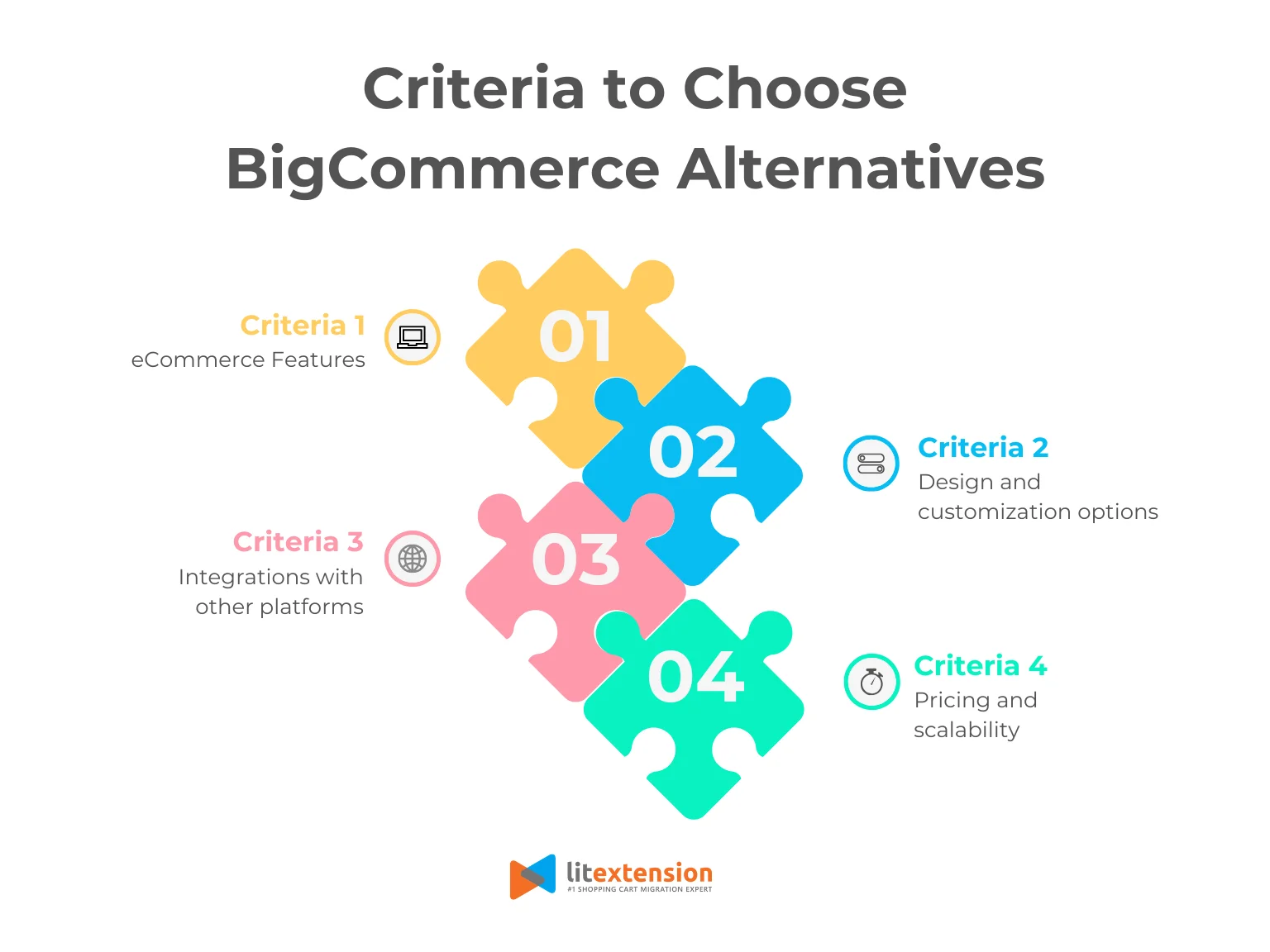Choosing the right platform to build and manage your online store can be a critical factor for success. While BigCommerce is still a popular choice for businesses of all sizes, exploring BigCommerce alternatives can open up a world of possibilities for your business.
Indeed, there are plenty of powerful alternatives to BigCommerce to consider. To help you make the right choice, LitExtension – the #1 Ecommerce Migration Expert will review the 10 best BigCommerce alternative platforms, comparing their key features, pricing, and pros and cons.
Here are the top 12 BigCommerce alternatives for your consideration:
- #1 Shopify
- #2 Wix
- #3 WooCommerce
- #4 Adobe Commerce/Magento
- #5 commercetools
- #6 Squarespace
- #7 PrestaShop
- #8 Salesforce Commerce Cloud
- #9 Volusion
- #10 Oracle Commerce
- #11 Weebly
- #12 OpenCart
Whether you're a small business owner or managing a large enterprise, keep reading to discover the perfect BigCommerce alternative to power your online success!
Top 12 BigCommerce Alternatives to Consider
If you’re looking to switch from BigCommerce, the good news is that there are plenty of great alternatives, each with its own strengths, focus, and pricing. Some platforms are better for beginners with small catalogs, while others are built for large enterprises with complex needs. This variety allows you to find a solution that matches your business model, technical skill level, and long-term goals.
Below is a quick comparison of the top 12 BigCommerce alternatives. This table will help you understand what each platform offers, why it could be a better fit than BigCommerce, and which type of business it serves best.
Platform | Why choose over BigCommerce | Best for |
Shopify | - Easier for beginners to set up and manage | Beginners, fast-growing D2C brands |
Wix | - True drag-and-drop builder with creative freedom | Creatives, small businesses, visual brands |
WooCommerce | - Open-source and free to use | WordPress users, developers, freelancers |
Adobe Commerce | - More advanced B2B and B2C features | Large enterprises, complex B2B/B2C models |
commercetools | - Headless, API-first setup for complete frontend freedom | Tech-driven enterprises, omnichannel brands |
Squarespace | - Open-source with multilingual/multi-currency support | Designers, artists, lifestyle businesses |
PrestaShop | - Open-source with multilingual/multi-currency support | SMEs with developer access, international sellers |
Salesforce Commerce Cloud | - AI-powered personalization and search | Enterprise brands with large product catalogs |
Volusion | - More affordable for startups | New sellers with basic needs |
Oracle Commerce | - Built for large-scale enterprise operations | Corporations with large IT teams |
Weebly | - Extremely easy to use | Hobbyists, local retailers, solopreneurs |
OpenCart | - Completely free to use | Tech-savvy sellers, cost-conscious businesses |
These BigCommerce alternatives range from hosted solutions to open-source platforms, giving you the flexibility to choose what fits your goals. In the next sections, we’ll dive deeper into each platform so you can make a confident, informed decision.
#1. Shopify
Shopify is one of the most popular BigCommerce alternatives, trusted by over 6.2 million businesses worldwide. It is a hosted eCommerce platform designed to help users build online stores quickly, with no coding skills required. From solo entrepreneurs to large brands, Shopify offers a flexible and beginner-friendly experience that adapts to almost any business model.

The main reason why Shopify tops our list of BigCommerce alternatives is its focus on growth. The platform offers scalable plans that support both startups and large-scale enterprises. It also handles hosting, security, and performance optimization automatically, so you can focus more on running your business.
Now, let’s compare how Shopify stacks up against BigCommerce in key areas:
Where Shopify wins over BigCommerce | Where Shopify falls short |
- Easier to use for beginners - Larger app ecosystem with more integrations - More free and paid theme options - Better mobile editing and design tools | - Fewer built-in B2B features like price lists - Less flexible checkout customization without Plus plan - Transaction fees apply unless you use Shopify Payments - Advanced analytics locked behind higher-tier plans |
Who is Shopify for?
Shopify is ideal for entrepreneurs and small to mid-sized businesses that want to launch an online store without dealing with technical setup or maintenance. It’s perfect for those who prefer a clean, intuitive interface and a strong support system.
#2. Wix
Wix is one of the most user-friendly BigCommerce alternatives, designed for small business owners, creatives, and beginners who want to build an online store without any coding experience. With over 8.6 million users worldwide (according to BuiltWith), Wix combines beautiful design tools with solid eCommerce capabilities, making it a strong choice for those who prioritize simplicity and visual appeal.

What sets Wix apart from many other BigCommerce alternatives is its well-known drag-and-drop editor, which gives you full control over your site’s layout and design. You can choose from over 2,000 designer-made templates, then customize them to match your brand. The setup process is also smooth, with hosting included, so you can start kicking off your online business right away.
For a clearer overview of BigCommerce vs BigCommerce, check out the table below:
Where Wix wins over BigCommerce | Where Wix falls short |
- Offers a true drag-and-drop editor for full design control. - Gives more visual freedom with customizable layouts and animations. - Starts at a lower price and includes a free plan for testing. - Includes AI-powered site builder (Wix ADI) for faster setup. | - Lacks advanced tools for managing large or complex stores. - Has fewer built-in features for B2B or multi-currency selling. - Smaller app marketplace and fewer advanced integrations. - Limited checkout and SEO customization without coding. |
Who is Wix for?
Wix is best suited for entrepreneurs, freelancers, and small businesses that want to launch an attractive online store quickly and affordably. However, for complex eCommerce needs or high-volume stores, you may eventually outgrow Wix and need a more scalable platform.
#3. WooCommerce
WooCommerce is one of the most flexible BigCommerce alternatives, especially for users who are already familiar with WordPress. As a free, open-source plugin, WooCommerce lets you turn any WordPress site into a fully functional online store with complete control over design, features, and hosting.
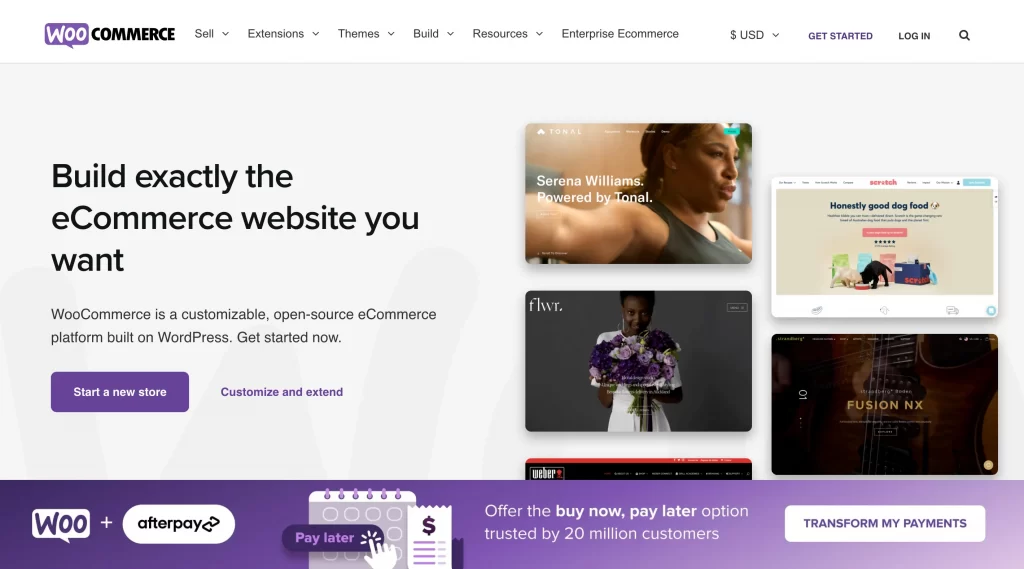
Unlike hosted platforms like BigCommerce, WooCommerce gives you full ownership of your store and data. You can choose your own hosting provider, use thousands of WordPress plugins, and customize every part of your site to match your needs.
Another advantage is the cost. While WooCommerce itself is free, you only pay for the add-ons and services you need. This flexible pricing structure allows businesses to start lean and scale on their own terms. However, because it’s self-hosted, WooCommerce does require more hands-on setup and ongoing maintenance.
Here’s how WooCommerce vs BigCommerce in key areas:
Where WooCommerce wins over | Where WooCommerce falls short |
- Offers full control over hosting, code, and store data - More customizable with access to 50,000+ WordPress plugins - No monthly platform fee, pay only for what you use - Large open-source community for themes and extensions | - Requires technical setup and regular maintenance - Can be time-consuming to configure and manage - Lacks built-in support and centralized customer service - Performance depends on your chosen hosting provider |
Who is WooCommerce for?
WooCommerce is best suited for businesses that are already using WordPress or want full flexibility in building their store. If you don’t mind managing the technical side and want to avoid ongoing subscription fees, WooCommerce is among the most powerful BigCommerce alternatives.
#4. Adobe Commerce/Magento
Adobe Commerce, previously known as Magento, is one of the most powerful and flexible BigCommerce alternatives on the market. It’s designed for businesses that want total control over their eCommerce setup, from storefront customization to backend management and global scalability.
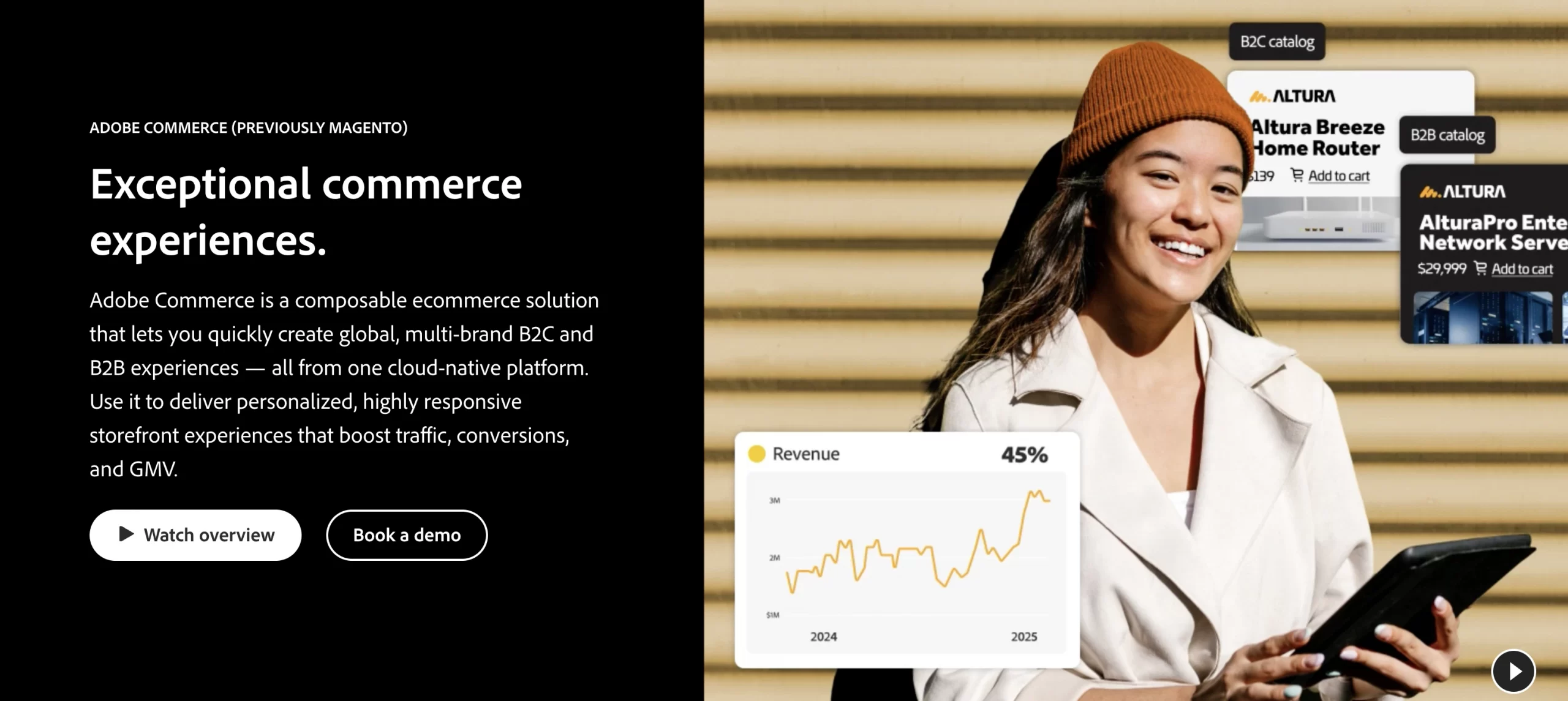
Unlike hosted solutions, Adobe Commerce gives you complete freedom to build a store that fits even the most complex business requirements. You can handle multiple stores, languages, currencies, and even B2B functionalities from one central dashboard.
Additionally, this platform also supports custom pricing, tiered discounts, bulk ordering, and powerful integration with ERP or CRM systems. However, because of its complexity, running a Magento-based store often requires experienced developers and a dedicated technical team.
Here’s a quick breakdown of how Adobe Commerce compares to BigCommerce in key areas:
Where Adobe Commerce wins over | Where Adobe Commerce falls short |
- Allows unlimited customization and full backend control - Offers advanced B2B tools like company accounts and custom pricing - Supports multi-store, multi-language, and global selling - Provides an open-source version for total store ownership | - Requires technical expertise for setup and maintenance - Higher development and hosting costs compared to SaaS models - Slower setup process with more manual configurations |
Who is Adobe Commerce for?
Adobe Commerce is ideal for large enterprises, wholesalers, and global eCommerce businesses that need high performance and advanced customization. If you’re looking for BigCommerce alternatives that offer full control, scalability, and room for custom features, Adobe Commerce is one of the best platforms to consider.
#5. Commercetools
commercetools is one of the most modern BigCommerce alternatives, built entirely around headless commerce architecture. This means it separates the frontend (what customers see) from the backend (where store data and logic live), giving developers full freedom to create fast, personalized shopping experiences across any device or channel.
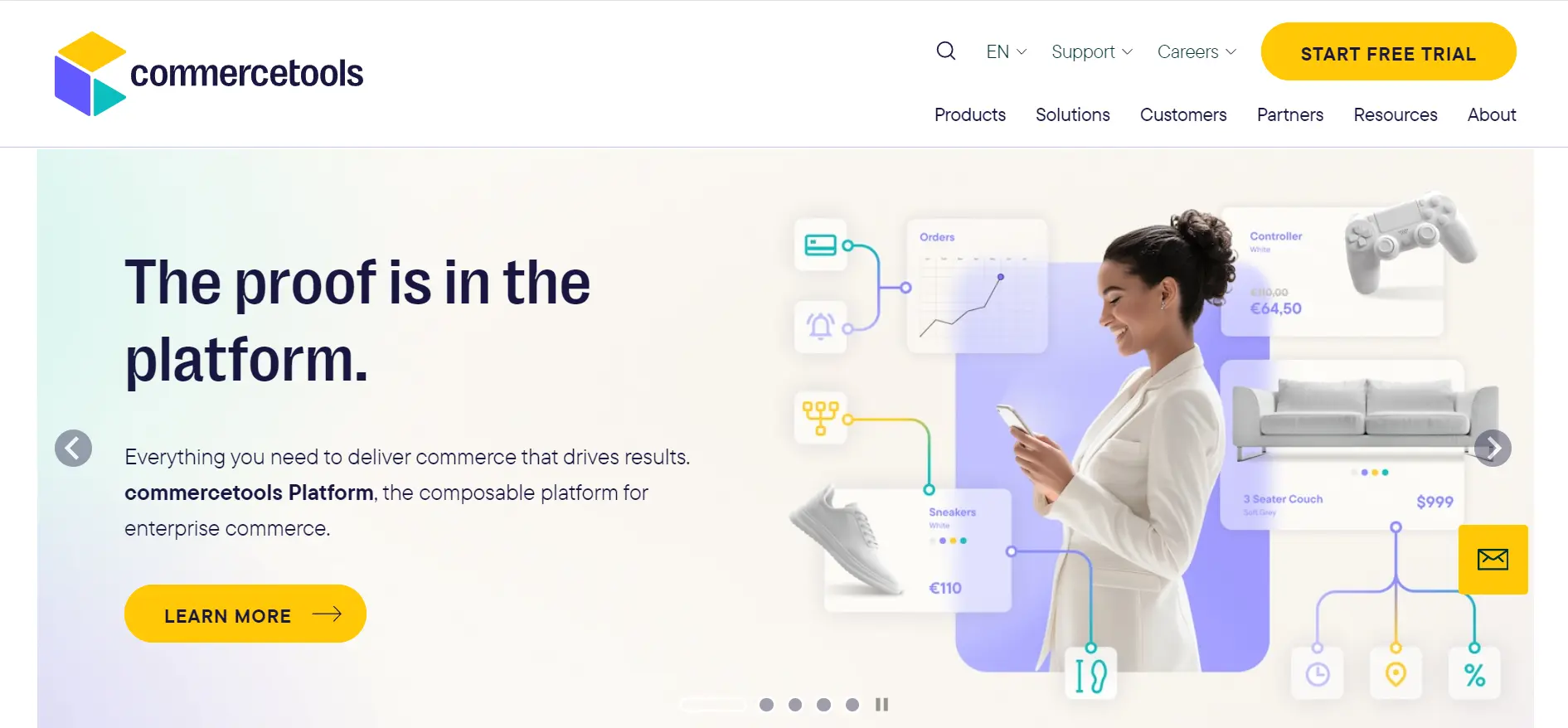
Unlike traditional platforms like BigCommerce, commercetools is API-first and cloud-native. It’s designed to meet the needs of fast-scaling brands, enterprise retailers, and tech-driven businesses that want full control over their digital commerce stack. Instead of offering an all-in-one package, commercetools lets you build your ideal setup by connecting best-in-class services, whether for payments, CMS, or search.
Because of its modular nature, commercetools offers flexibility and performance that few BigCommerce alternatives can match. However, it’s not for everyone. The platform requires strong technical resources, a development team, and a clear architecture strategy to unlock its full potential.
Here’s a quick comparison of commercetools vs BigCommerce:
Where commercetools wins over | Where commercetools falls short |
- Offers full flexibility through API-first, headless architecture - Enables custom storefronts across web, mobile, and IoT - Easily integrates with best-in-class third-party services - Ideal for large-scale, multi-channel, and global selling | - Not beginner-friendly, requires experienced developers - No built-in CMS, themes, or drag-and-drop tools - Longer and more expensive implementation process |
Who is commerectools for?
commercetools is best suited for enterprise-level businesses and tech-forward brands that want to build highly customized commerce experiences. If your team values agility, performance, and full architectural control, and you’re looking for future-proof BigCommerce alternatives, then commercetools should be on your shortlist.
#6. Squarespace
Squarespace is one of the most design-friendly BigCommerce alternatives, best known for its beautiful templates and intuitive interface. Originally built as a website builder for creatives and bloggers, Squarespace has expanded its features to support small eCommerce businesses that want to sell online without sacrificing aesthetics or ease of use.

With Squarespace, users can create visually impressive stores using award-winning templates tailored for fashion, art, photography, and lifestyle brands. The drag-and-drop editor requires no coding, making it easy to customize pages, product layouts, and mobile versions.
Unlike some BigCommerce alternatives focused on scale or B2B, Squarespace shines for those who prioritize design, simplicity, and storytelling. The built-in tools also include email marketing, blog integration, and basic SEO options, ideal for personal brands or small creative businesses looking to build a strong online presence.
Here’s the detailed comparison of Squarespace vs BigCommerce:
Where Squarespace wins over | Where Squarespace falls short |
- Offers professionally designed templates for stunning storefronts - Built-in blog, email marketing, and branding tools - Simpler interface and faster setup process - Ideal for creatives, artists, and lifestyle brands | - Limited scalability for large or complex stores - Limited scalability for large or complex stores with no built-in support for multi-store or B2B selling - Basic inventory and shipping settings |
Who is Squarespace for?
Squarespace is ideal for small business owners, creators, and personal brands who want a beautiful online store that’s easy to set up and maintain. If you’re looking for BigCommerce alternatives that focus more on storytelling, visual appeal, and all-in-one simplicity, rather than complex backend capabilities, Squarespace is a great fit.
#7. PrestaShop
PrestaShop is one of the most well-known open-source BigCommerce alternatives, offering full control over your store’s functionality, hosting, and design. Unlike hosted platforms, PrestaShop gives you the freedom to build and manage a store your way, with no monthly subscription fees and access to a large developer community.

With PrestaShop, you can customize nearly every aspect of your store, from product pages and shipping rules to currencies, taxes, and customer groups. It supports multilingual and multi-currency selling out of the box, making it a strong choice for international businesses.
While PrestaShop offers more flexibility than many BigCommerce alternatives, it does come with added responsibility. You’ll need to manage your own hosting, updates, security, and performance optimization. The interface can also feel outdated compared to modern SaaS platforms, and some modules may require custom coding or paid licenses.
Here’s how PrestaShop stacks up against BigCommerce:
Where PrestaShop wins over | Where PrestaShop falls short |
- No monthly platform fee, only pay for hosting and modules - Fully customizable with access to theme and code files - Supports multilingual and multi-currency selling out-of-the-box - Open-source with a large, active global community | - Requires technical knowledge for setup and maintenance - Many features rely on paid third-party modules - Harder to scale without a developer or agency |
Who is PrestaShop for?
PrestaShop is best suited for small to mid-sized businesses with technical experience or access to a developer who want to control every part of their store. If you're exploring BigCommerce alternatives and prefer open-source platforms that allow full customization, PrestaShop is a flexible and cost-effective choice.
#8. Salesforce Commerce Cloud
Salesforce Commerce Cloud is one of the most advanced BigCommerce alternatives designed specifically for large enterprises and global retailers. It’s a cloud-based platform built to support high-volume sales, multi-channel strategies, and deeply personalized shopping experiences.
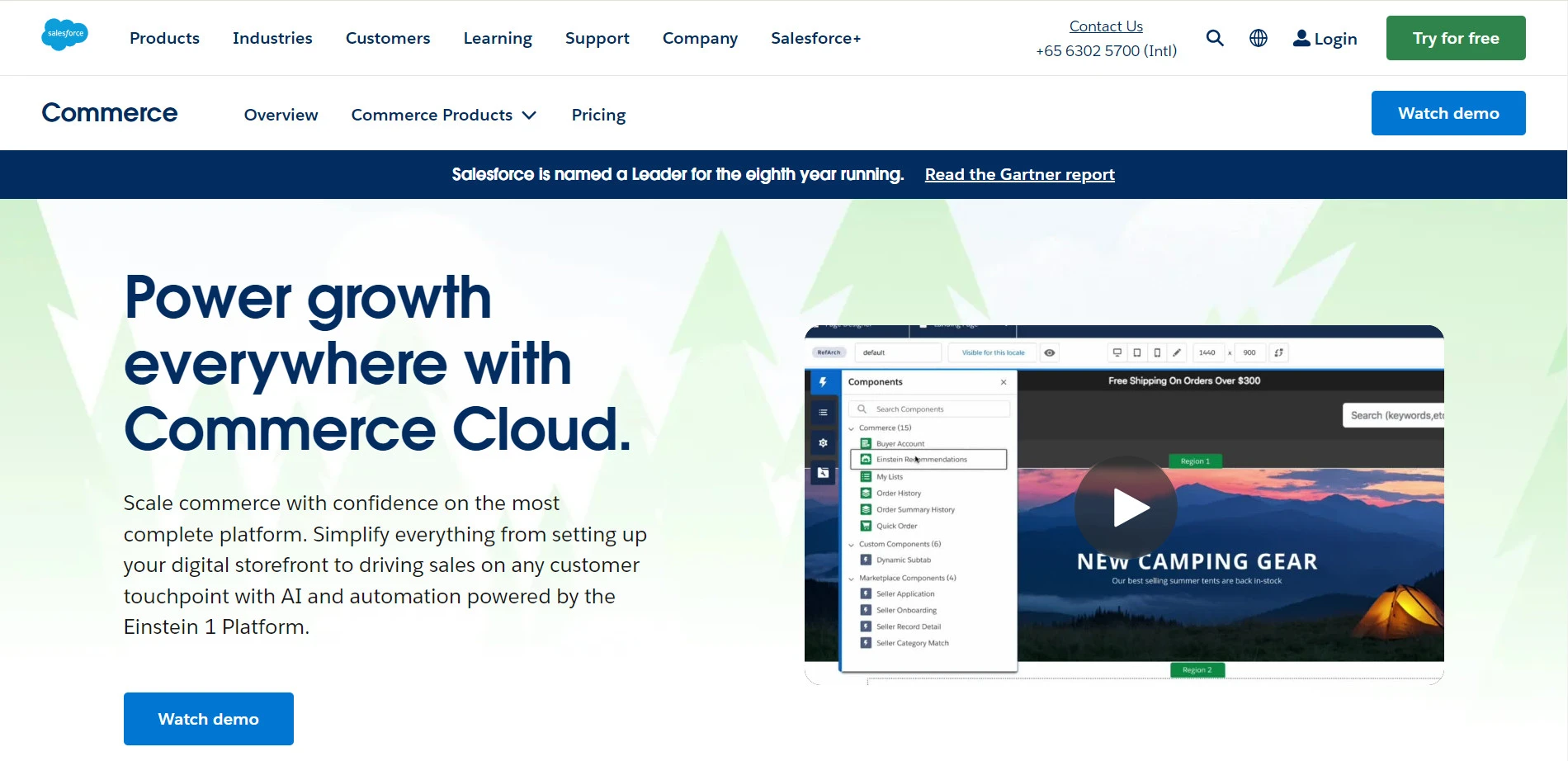
What sets Salesforce Commerce Cloud apart from other BigCommerce alternatives is its enterprise-level architecture. The platform is built for scalability, allowing businesses to handle thousands of SKUs, multiple regional storefronts, and complex customer journeys with ease. It also includes powerful features like AI-powered product recommendations (via Salesforce Einstein), advanced merchandising tools, and automated promotions.
However, this level of power comes with complexity and cost. Salesforce Commerce Cloud is not suitable for small businesses or beginners. Implementation requires a dedicated development team or agency partner, and pricing is based on revenue share, making it a significant investment.
Let’s compare the strengths and limitations of Salesforce Commerce Cloud vs BigCommerce:
Where Salesforce Commerce Cloud wins over | Where Salesforce Commerce Cloud falls short |
- Built for large-scale, high-volume enterprise operations - Seamless integration with Salesforce CRM, Marketing Cloud, and Service Cloud - Includes AI tools like product recommendations and predictive sorting - Supports multi-store, multi-language, and regional catalogs | - High cost with pricing based on GMV (gross merchandise volume) - Complex implementation and longer deployment timelines - Not suitable for small or mid-sized businesses - Requires technical partners or certified developers to manage |
Who is Salesforce Commerce Cloud for?
Salesforce Commerce Cloud is ideal for enterprise-level retailers with complex business models, high transaction volumes, and global reach. If you're looking for BigCommerce alternatives that can integrate with advanced CRM, marketing automation, and AI-driven personalization tools, Salesforce Commerce Cloud delivers a complete, unified solution for digital commerce at scale.
#9. Volusion
Volusion is one of the earliest BigCommerce alternatives to enter the market, offering a hosted eCommerce solution aimed primarily at small businesses and beginners. While it may not be as modern or feature-rich as newer platforms, Volusion still provides essential tools for launching and managing an online store with ease.
With Volusion, you get built-in features like product and inventory management, promotional tools, responsive themes, and secure checkout, all without needing to manage hosting or updates. However, this platform lacks advanced customization, limited third-party app support, and does not offer blogging functionality natively. These limitations make it less competitive compared to other BigCommerce alternatives that prioritize extensibility and innovation.
Here’s a look at the Volusion vs BigCommerce comparison:
Where Volusion wins over | Where Volusion falls short |
- Lower starting price, making it budget-friendly for beginners - Simple setup process with essential built-in features - All-in-one hosted solution with no coding needed | - Outdated interface and limited design flexibility - No native blogging feature, requiring external solutions - Fewer integrations and apps compared to BigCommerce - Lacks robust support for scaling or international selling |
Who is Volusion for?
Volusion is best suited for individuals or small businesses with simple product catalogs and limited technical needs. If you're exploring BigCommerce alternatives and want a low-cost, entry-level platform to test eCommerce with minimal setup, Volusion can be a starting point, but it may not be ideal for long-term growth or larger operations.
#10. Oracle Commerce
Oracle Commerce is one of the most advanced BigCommerce alternatives for large enterprises with complex eCommerce operations. Built to serve high-volume retailers, B2B businesses, and multinational brands, Oracle Commerce offers robust customization, deep data integration, and scalable infrastructure tailored to enterprise-level demands.
This platform stands out for its ability to connect deeply with internal systems like ERP, CRM, and supply chain tools. Businesses can create personalized shopping experiences using real-time customer data, manage massive product catalogs, and operate multiple storefronts across different regions or business models, all within a unified system.
Compared to most BigCommerce alternatives, Oracle Commerce is highly customizable and built for flexibility. However, it comes with a high price tag and requires experienced development teams or long-term IT partners to implement and maintain. It’s not designed for small businesses or teams with limited technical resources.
Here’s how Oracle Commerce compares to BigCommerce in key areas:
Where Oracle Commerce wins over | Where Oracle Commerce falls short |
- Supports large-scale B2B and B2C operations under one platform - Integrates easily with ERP, CRM, and legacy enterprise tools - Handles high-volume product catalogs and global selling - Advanced personalization and customer segmentation capabilities | - Complex and costly to implement and manage - Requires in-house developers or agency partnerships - Longer deployment timelines compared to SaaS platforms - Not suitable for small or mid-market businesses |
Who is Oracle Commerce for?
Oracle Commerce is best suited for large enterprises with custom workflows, multi-brand setups, or B2B/B2C hybrid models. If you're searching for BigCommerce alternatives that can integrate deeply with enterprise systems and scale globally, Oracle Commerce offers the power and flexibility needed, provided you have the resources to support it.
#11. Weebly
Weebly is one of the most accessible BigCommerce alternatives, designed for individuals, small businesses, and side hustlers who want to launch an online store with minimal effort. Now owned by Square (Block, Inc.), Weebly combines easy-to-use website building tools with essential eCommerce features—making it a solid choice for beginners on a budget.

With its drag-and-drop editor, Weebly allows users to create visually clean websites without touching a line of code. It offers pre-built templates, mobile responsiveness, and built-in tools for product listing, inventory tracking, shipping, and taxes. Because it’s tightly integrated with Square’s payment system, Weebly is especially convenient for merchants who also sell offline or through pop-up stores.
However, compared to more robust BigCommerce alternatives, Weebly is quite limited in terms of scalability, app integrations, and advanced customization. However, its simplicity and low price point make it a practical option for launching small, straightforward eCommerce projects quickly.
Here’s a quick comparison between Weebly and BigCommerce:
Where Weebly wins over | Where Weebly falls short |
- Easier to use with a true drag-and-drop editor - Lower starting price, with affordable monthly plans - Ideal for combining online and offline sales via Square - Great for beginners launching simple product sites | - Limited scalability for growing or complex stores - Fewer third-party apps and integrations available - Minimal design flexibility and template customization - Lacks advanced marketing, SEO, and B2B features |
Who is Weebly for?
Weebly is best for individuals, hobbyists, or local businesses who want to get online quickly without technical stress. If you’re exploring BigCommerce alternatives and need a platform that’s affordable, easy to use, and works well with Square POS, Weebly is a practical and beginner-friendly solution.
#12. OpenCart
OpenCart is a lightweight, open-source platform that stands out as one of the most flexible and budget-friendly BigCommerce alternatives. It’s completely free to download and use, giving users full control over their online store’s hosting, functionality, and design. This makes OpenCart a great option for developers, small business owners, or anyone comfortable managing their own tech stack.
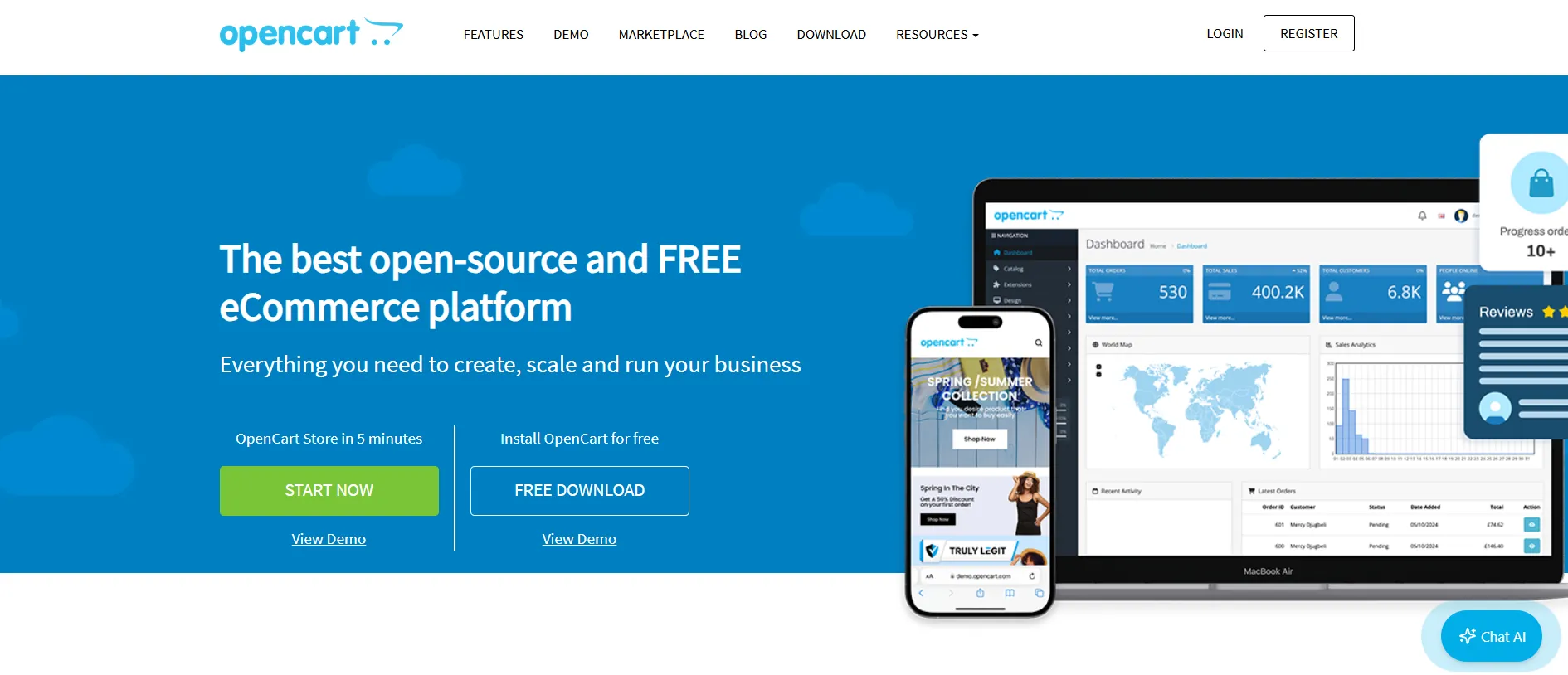
With OpenCart, you can manage multiple stores from a single admin dashboard, set custom shipping and tax rules, and access thousands of extensions to enhance your site. It supports multiple languages and currencies, allowing you to sell internationally without extra plugins. The built-in features cover most of what a small to mid-sized business needs, including product management, order processing, discount creation, and reporting.
Compared to other BigCommerce alternatives, OpenCart is more DIY. It doesn’t include hosting, security, or automatic updates, so you’ll need to handle those separately. Additionally, some extensions may not be well-supported or may require custom development to work smoothly with your setup.
Here’s how OpenCart compares to BigCommerce:
Where OpenCart wins over | Where OpenCart falls short |
- 100% free to use with no monthly subscription fees - Fully open-source and developer-friendly - Supports multi-store, multi-language, and multi-currency - Lightweight platform that runs well on basic servers | - Requires manual setup for hosting, security, and updates - Some extensions lack quality control or support - Limited out-of-the-box features compared to BigCommerce |
Who is OpenCart for?
OpenCart is a solid choice for small to mid-sized businesses that want a flexible, open-source platform without ongoing subscription costs. If you’re comparing BigCommerce alternatives and you’re comfortable with self-hosting and customization, or working with a developer, OpenCart gives you full control at a low cost.
5 Reasons You Should Find BigCommerce Alternatives
BigCommerce is a well-known eCommerce platform, but it’s not the best fit for every business. Depending on your goals, budget, and technical resources, you might find more value in exploring other platforms.
Below are five common reasons why many businesses actively search for BigCommerce alternatives.
1. High total cost of ownership
While BigCommerce offers competitive pricing on the surface, extra costs can add up fast, especially if you're scaling. Features like advanced filtering, third-party apps, or custom functionalities may require higher-tier plans or developer support. Some businesses find more affordable or flexible solutions with other platforms.
2. Limited design flexibility
BigCommerce’s themes are responsive and functional, but customizing them often requires coding. For users who want drag-and-drop design freedom or highly visual layouts, platforms like Shopify or Wix offer more flexibility without the need for developer input.
3. Complex setup for beginners
BigCommerce isn’t the easiest platform for non-technical users. Its interface is built for scalability, but it can overwhelm first-time store owners. If you're looking for a platform with simpler onboarding and faster setup, a more beginner-friendly alternative might be better.
4. Fewer native B2B features in lower plans
While BigCommerce does offer B2B functionality, many of its powerful features, like custom pricing, company accounts, and advanced segmentation, are only available through expensive plans or add-ons. Other platforms may offer built-in B2B tools without upgrading to enterprise-level pricing.
5. Limited built-in apps and integrations
Compared to platforms with massive app ecosystems, BigCommerce has fewer built-in tools and integrations. If your business relies on third-party software for marketing, accounting, or shipping, it may take more work or custom development to get everything running smoothly.
What to Consider When Choosing a BigCommerce Alternative
When it comes to choosing one out of many BigCommerce alternatives that suits your business the most, there are several important factors to consider. From eCommerce features to pricing and scalability, each platform has its own unique strengths and weaknesses.
Here are some key factors to keep in mind when evaluating your options:
1. eCommerce features
One of the most important considerations when choosing an eCommerce platform is the range of features and tools it offers. Compared to other BigCommerce alternatives, you should find a platform with robust inventory management, payment processing, and shipping tools. Make sure the platform you choose has the features you need to run your business effectively.
2. Design and customization options
Your eCommerce site's design plays a crucial role in attracting and converting customers. A platform that offers a range of customizable templates with design options, as well as the ability to add custom code and third-party integrations, will ultimately be the best choice. Your eCommerce platform should allow you to create a unique and visually appealing storefront that reflects your brand image.
3. Integrations with other platforms
No eCommerce platform can stand alone. Thus, it's important to choose a platform that can seamlessly integrate with other key business systems like your CRM, marketing automation tools, and multichannel selling software. Considering a platform that offers an extensive library of integrations or an open API will help you to effortlessly integrate with other platforms.
4. Pricing and scalability
Cost is always an important factor when it comes to choosing an eCommerce platform. Normally, each platform will be associated with different upfront and ongoing costs. You should look for a platform that offers transparent pricing with no hidden fees and flexible pricing plans that can accommodate your business's growth.
Additionally, you'll also want to consider the platform's scalability. This is because you'll want a solution that can grow with your business and accommodate spikes in traffic and sales.
BigCommerce Alternatives: FAQs
What is the equivalent of BigCommerce?
There are several BigCommerce alternatives available on the market, including Shopify, WooCommerce, Magento, Volusion, Squarespace, WIX, and Prestashop. Each platform has its own unique features and benefits. Thus, it is important to evaluate them based on your specific business needs.
Which is easier to use: Shopify or BigCommerce?
Both Shopify and BigCommerce are user-friendly platforms that offer a great range of features and customization options.
However, Shopify is generally considered to be easier to use, with a more intuitive interface and simpler setup process. BigCommerce, on the other hand, may require a bit more technical know-how to get started, but it also offers more advanced features and scalability.
What is the best eCommerce platform?
There is no one-size-fits-all answer to this question since the best eCommerce platform for your business will depend on your specific needs and requirements.
Shopify, BigCommerce, and WooCommerce are all popular eCommerce solutions, each offering a wide variety of functionalities.
Other platforms like Magento, Volusion, Squarespace, WIX, and Prestashop may also be worth considering depending on your business goals and budget.
What are the disadvantages of BigCommerce?
While BigCommerce is a popular eCommerce platform with many benefits, there are some potential disadvantages to be aware of. These include:
- A relatively high cost compared to some other platforms
- A steeper learning curve for beginners
- Some users may find the platform's design and functionalities to be somewhat outdated or clunky compared to more modern, user-friendly optimized competitors.
Final Thoughts
Ultimately, choosing the right eCommerce platform can have a significant impact on the success of your online business. By carefully considering features or integrations, you can choose a BigCommerce alternative that meets your unique needs and goals.
Once you've found the perfect platform, the next step is migrating your store data. Moving your valuable product information, customer details, and order history can seem daunting, but it doesn't have to be. LitExtension, the #1 eCommerce migration expert, specializes in making eCommerce migrations smooth and stress-free. With automated tools, expert support, and a proven track record, LitExtension can help you migrate your BigCommerce store to a more robust platform seamlessly!
Feel free to contact us for any further details. In the meantime, follow our eCommerce blog for more useful online selling insights! Also, join our Facebook Community for the latest insider tips and tricks from 18,000+ global entrepreneurs.

